
FACULTY OF ARTS AND SCIENCES
Department of Sociology
HIST 100 | Course Introduction and Application Information
| Course Name |
Principles of Atatürk and History of Revolution
|
|
Code
|
Semester
|
Theory
(hour/week) |
Application/Lab
(hour/week) |
Local Credits
|
ECTS
|
|
HIST 100
|
Spring
|
4
|
0
|
4
|
4
|
| Prerequisites |
None
|
|||||
| Course Language |
Turkish
|
|||||
| Course Type |
Required
|
|||||
| Course Level |
-
|
|||||
| Mode of Delivery | - | |||||
| Teaching Methods and Techniques of the Course | - | |||||
| Course Coordinator | ||||||
| Course Lecturer(s) | ||||||
| Assistant(s) | - | |||||
| Course Objectives | Experienced in the transition to the Republic of Turkey from the Ottoman Empire State advances to students. The Republic of Turkey is being established through the social, political, educational and cultural etc. to understand the revolution in the field and the purpose of these reforms. |
| Learning Outcomes |
The students who succeeded in this course;
|
| Course Description | This course provides a general information of the events from the end of the 19. century until the end of the Turkish War of Independence and the signing of the Treaty of Lausanne in 1923 and the following period until 1990’s. |
|
|
Core Courses |
X
|
| Major Area Courses | ||
| Supportive Courses | ||
| Media and Management Skills Courses | ||
| Transferable Skill Courses |
WEEKLY SUBJECTS AND RELATED PREPARATION STUDIES
| Week | Subjects | Related Preparation |
| 1 | Course aim and related words | Bernard Lewis, Modern Türkiye’nin Doğuşu, s: 31-57 |
| 2 | The Reasons of the Collapse of Ottoman State Ottoman Reforms | Bernard Lewis, Modern Türkiye’nin Doğuşu, s:104-179 |
| 3 | The State of the Ottoman Empire in the Early 20th Century | Bernard Lewis, Modern Türkiye’nin Doğuşu, s:42-44 |
| 4 | World War I and the Fall of the Ottoman Empire | Refik Turan, Mustafa Sarhan, Atatürk İlkeleri ve İnkılap Tarihi, s. 44-58 |
| 5 | Ottoman State after Mudros Armistice | Refik Turan, Mustafa Sarhan, Atatürk İlkeleri ve İnkılap Tarihi, s. 65-78 |
| 6 | Preparation for The National Struggle | Mustafa Kemal Atatürk, Nutuk, 100-150 |
| 7 | Opening and Works of the Turkish Grand National Assembly | Refik Turan, Mustafa Sarhan, Atatürk İlkeleri ve İnkılap Tarihi, s. 118-121 |
| 8 | Political and Military Developments after the Grand National Assembly | Refik Turan, Mustafa Sarhan, Atatürk İlkeleri ve İnkılap Tarihi, s. 132-140 |
| 9 | Lausenne Peace Agreement and Political Reforms | Refik Turan, Mustafa Sarhan, Atatürk İlkeleri ve İnkılap Tarihi, s. 176-192 |
| 10 | Turkish Revolutions In Ataturk Era | Refik Turan, Mustafa Sarhan, Atatürk İlkeleri ve İnkılap Tarihi, s.192-220 |
| 11 | Foreign Policy of Atatürk Period (1923-1938) | Refik Turan, Mustafa Sarhan, Atatürk İlkeleri ve İnkılap Tarihi, s.227-248 |
| 12 | Ismet Inonu Period | Bernard Lewis, Modern Türkiye’nin Doğuşu, s:393-437 |
| 13 | Democrat Party Period | Bernard Lewis, Modern Türkiye’nin Doğuşu, s:393-437 |
| 14 | Turkey During the Cold War | Refik Turan, Mustafa Sarhan, Atatürk İlkeleri ve İnkılap Tarihi, s.385-386 |
| 15 | Review of the Semester | |
| 16 | - |
| Course Notes/Textbooks | Refik Turan, Mustafa Safran, Atatürk İlkeleri ve İnkılap Tarihi, Ankara, 2011 |
| Suggested Readings/Materials | Mustafa Kemal Atatürk, Nutuk, Atatürk Araştırma Merkezi, Ankara 2005 Bernard Lewis, Modern Türkiye’nin Doğuşu, Ankara, 2017 |
EVALUATION SYSTEM
| Semester Activities | Number | Weigthing |
| Participation |
20
|
|
| Laboratory / Application | ||
| Field Work | ||
| Quizzes / Studio Critiques |
-
|
-
|
| Portfolio | ||
| Homework / Assignments | ||
| Presentation / Jury | ||
| Project | ||
| Seminar / Workshop | ||
| Oral Exams | ||
| Midterm |
1
|
35
|
| Final Exam |
1
|
45
|
| Total |
| Weighting of Semester Activities on the Final Grade |
3
|
50
|
| Weighting of End-of-Semester Activities on the Final Grade |
1
|
50
|
| Total |
ECTS / WORKLOAD TABLE
| Semester Activities | Number | Duration (Hours) | Workload |
|---|---|---|---|
| Theoretical Course Hours (Including exam week: 16 x total hours) |
16
|
4
|
64
|
| Laboratory / Application Hours (Including exam week: '.16.' x total hours) |
16
|
-
|
0
|
| Study Hours Out of Class |
14
|
2
|
28
|
| Field Work |
0
|
||
| Quizzes / Studio Critiques |
-
|
0
|
|
| Portfolio |
0
|
||
| Homework / Assignments |
0
|
||
| Presentation / Jury |
0
|
||
| Project |
0
|
||
| Seminar / Workshop |
0
|
||
| Oral Exam |
0
|
||
| Midterms |
1
|
12
|
12
|
| Final Exam |
1
|
16
|
16
|
| Total |
120
|
COURSE LEARNING OUTCOMES AND PROGRAM QUALIFICATIONS RELATIONSHIP
|
#
|
Program Competencies/Outcomes |
* Contribution Level
|
||||
|
1
|
2
|
3
|
4
|
5
|
||
| 1 | To have the knowledge of classical and contemporary theories in sociology, and be able to comparatively analyze these theories. |
|||||
| 2 | To have the knowledge of main methodological approaches in sociology as well as social research and data analysis methods. |
|||||
| 3 | To have knowledge in the fields of general sociology, sociology of institutions, social structure and change, and applied sociology. |
|||||
| 4 | To be able to determine the appropriate methods in the design of the planning stage and conclusion of a sociological project, individually or as part of a team. |
|||||
| 5 | To be able to diagnose the social dynamics behind personal problems by using sociological imagination. |
|||||
| 6 | To be able to define social problems at local, national, and global level, and offer new policies for solutions. |
X | ||||
| 7 | To be able to apply commonly-used computer programs for data collection and analysis in sociological research. |
|||||
| 8 | To be able to develop a socially responsible, scientific and ethical perspective regarding the collection, analysis, interpretation and presentation of data. |
|||||
| 9 | To be able to analyze different aspects of the social world by drawing on the knowledge produced by other disciplines of the social sciences. |
X | ||||
| 10 | To be able to constantly renew herself/himself professionally by following scientific and technological developments in sociology and social research. |
|||||
| 11 | To be able to collect sociological data and communicate with sociologists and other social scientists in a foreign language ("European Language Portfolio Global Scale", Level B1). |
|||||
| 12 | To be able to speak a second foreign at a medium level of fluency efficiently. |
|||||
| 13 | To be able to relate the knowledge accumulated throughout the human history to their field of expertise. |
X | ||||
*1 Lowest, 2 Low, 3 Average, 4 High, 5 Highest
NEWS |ALL NEWS
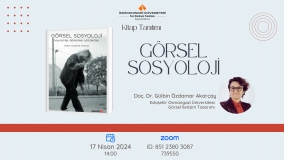
Book Presentation and Talk: Visual Sociology
Department of Sociology invites you to the Book Presentation and Talk event with Gülbin Özdamar Akarçay, the author of “Visual Sociology". Date:
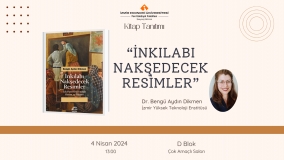
Book Presentation and Talk: Painting the Revolution
Department of Sociology invites you to the Book Presentation and Talk event with Dr. Bengü Aydın Dikmen, the author of “Painting the
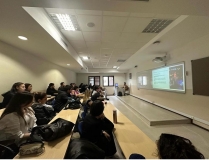
We welcomed ethnomusicologist Onur Sönmez.
We held our sociology seminar where we hosted ethnomusicologist Onur Sönmez. We thank him very much for this detailed and interesting presentation.
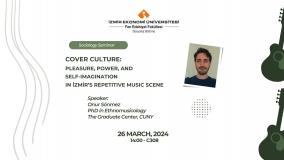
Cover Culture: Pleasure, Power, and Self-Imagination in İzmir’s Repetitive Music Scene
You are cordially invited to the Sociology Seminar where we will host Dr. Onur Sönmez. Onur Sönmez has a PhD in ethnomusicology
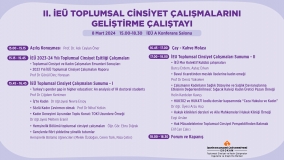
II. IUE GENDER STUDIES DEVELOPMENT WORKSHOP (EKOKAM- Gender and Women’s Studies Research and Application Center)
Research Assistant Helin Kardelen Kavuş attended the “II. IUE Gender Studies Development Workshop” on March 8, 2024, International Women's Day. Organized by EKOKAM, the workshop
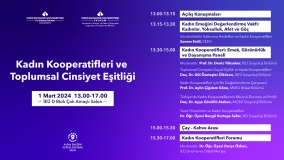
Women’s Cooperatives and Gender Equality
You are cordially invited to "Women's Cooperatives and Gender Equality", which will be co-organized by IUE EKOKAM, the Department of Sociology, and
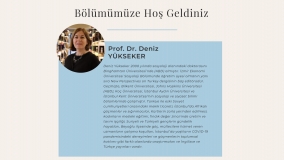
Welcoming Our New Faculty Member: Professor Deniz Yükseker
We are proud to welcome and introduce our newest faculty member: Professor Deniz Yükseker. We wish her all the best and success
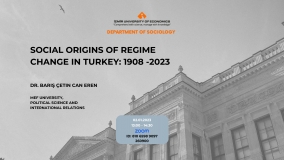
Sociology Seminar: Social Origins of Regime Change in Turkey: 1908 -2023
Department of Sociology cordially invites you to a seminar on "Social Origins of Regime Change in Turkey: 1908 - 2023" by Dr.



